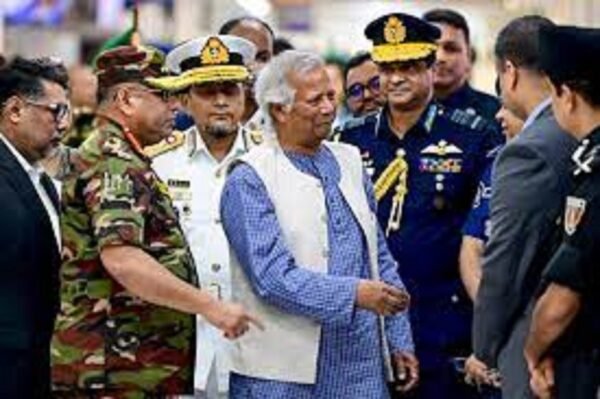Bangladesh Army Denies Rift with Government Amid Yunus Tensions

Amid swirling rumors of discord between the Bangladesh Army and the interim government led by Muhammad Yunus, the Army Headquarters has publicly denied any rift, asserting that both institutions are working in close coordination. This clarification comes after days of intense speculation in the media about possible disagreements and a potential split within the country’s leadership.
At a press briefing in Dhaka Cantonment, Brigadier General Nazim-Ud-Doula, Director of Military Operations, addressed concerns about alleged differences between the military and the government. He stated:
“There’s been speculation that there are serious differences between the government and the military. The way it’s being portrayed in the media is not accurate. We are working harmoniously and in mutual understanding. There is no room for misinterpretation. We should not assume the government and military are operating in conflict or thinking separately. That is not the case. The government and military are working together, and we strongly believe this cooperation will continue in thefuture.
The army’s statement follows a period of heightened tension marked by:
Reports of political friction and military pressure on Yunus to step down or expedite elections.
Release of convicted Islamist leaders and BDR mutineers by the interim government, which reportedly upset sections of the military.
Emergency closed-door meetings within the interim government to address rising tensions and clarify Yunus’s position, with advisers confirming he would remain in office.
Media coverage of possible disagreements over the direction of reforms, the pace of elections, and the role of the military in governance.
While the official stance is one of unity, several reports highlight underlying tensions:
The Army Chief, General Waker-Uz-Zaman, and Yunus have reportedly disagreed over the timeline for elections and the release of controversial figures.
Yunus has been accused of stalling elections and consolidating power, which has led to frustration within the military leadership.
The military has taken steps to restrict public gatherings near the army chief’s residence and has shown signs of preparing for possible countermeasures.
Despite these reported frictions, both the army and the government have presented a united front publicly. Advisers to Yunus emphasize that the interim government remains committed to its responsibilities and that Yunus will not resign at this time. The army insists that cooperation with the government is ongoing and that rumors of a split are exaggerated.
| Official Position (Army/Govt) | Reported Tensions & Media Coverage |
|---|---|
| No rift; working in harmony and coordination | Disagreements over elections, release of prisoners |
| Cooperation will continue in the future | Military frustration over pace of reforms |
| Yunus remains in office, not resigning | Emergency meetings amid resignation rumors |
While official statements from the Bangladesh Army and interim government stress close cooperation and deny any rift, multiple reports indicate that significant tensions persist behind the scenes, particularly over the pace of democratic transition and controversial decisions by the Yunus administration. For now, both sides are publicly committed to working together, but the situation remains fluid as Bangladesh navigates a complex political transition.
